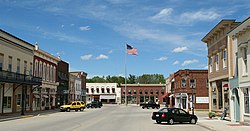Mazomanie (WI)
| Mazomanie, Wisconsin | |
|---|---|
| Village | |
 |
|
 Location of Mazomanie in Dane County, Wisconsin. |
|
| Coordinates: 43°10′28″N 89°47′41″W / 43.17444°N 89.79472°WCoordinates: 43°10′28″N 89°47′41″W / 43.17444°N 89.79472°W | |
| Country | United States |
| State | Wisconsin |
| County | Dane |
| Area | |
| • Total | 1.86 sq mi (4.82 km2) |
| • Land | 1.83 sq mi (4.74 km2) |
| • Water | 0.03 sq mi (0.08 km2) |
| Elevation | 745 ft (227 m) |
| Population (2010) | |
| • Total | 1,652 |
| • Estimate (2016) | 1,699 |
| • Density | 902.7/sq mi (348.5/km2) |
| Time zone | Central (CST) (UTC-6) |
| • Summer (DST) | CDT (UTC-5) |
| Area code(s) | 608 |
| FIPS code | 55-50250 |
| GNIS feature ID | 1583677 |
Mazomanie /ˌmeɪzoʊˈmeɪni/ is a village in Dane County, Wisconsin, United States. The population was 1,652 at the 2010 census. The village is located within the Town of Mazomanie. It is part of the Madison Metropolitan Statistical Area.
Mazomanie is located at 43°10′28″N 89°47′41″W / 43.17444°N 89.79472°W.
According to the United States Census Bureau, the village has a total area of 1.86 square miles (4.82 km2), of which, 1.83 square miles (4.74 km2) of it is land and 0.03 square miles (0.08 km2) is water.
The land on which rests the town of Mazomanie fell within the hunting grounds of the Hočąk, or Winnebago, Indian nation. About a decade after the Winnebago cession of 1832, there were only a small number of white settlers in the area. What precipitated the birth of the town was the advent of the Milwaukee and Mississippi Railroad in 1855, which passed through the region to connect Milwaukee with La Crosse. The superintendent of the railroad, Edward Brodhead, gave the village its name; many years later, he explained its derivation: “He (Mazomanie) was an Indian chief in our state and was well known to the old gentleman, H.L. Dousman, who said the Indians pronounced it as though it was spelled Man-zo-ma-nie and the English of it is Iron Horse, which I adopted for the name of a railroad town and also for the name of my horse.” This distinguished chief was Mą́zamąnį́ga, "Iron Walker."
...
Wikipedia
